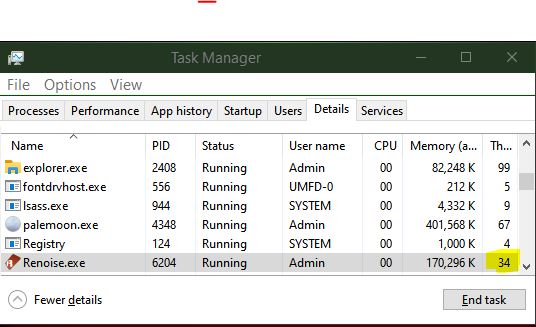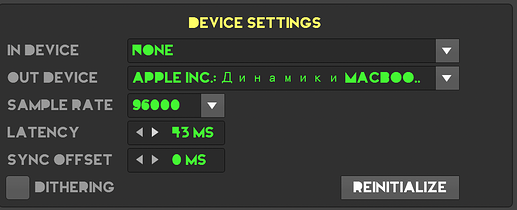I’m using the built-in sound card on my MacBook.
Does this happen with screenflow uninstalled?
this problem was before installing screenflow. I have a suspicion that renoise does not use multi-core in new versions of the operating system
Well unfamiliar with Apple, iirc it is BSD based, that said, output of:
sar -cpu -p ALL
Could help to troubleshoot further; you may need to tweak the command a bit for your environment.
Please post the output if you can.
Hth
Not working
I’m running Renoise 3.4 with an SSL+ audio device on Windows 11 since a couple of days, because I bought a new mobo and proc.
I have an i7 13700k processor unit, which reports 24 CPU’s in Renoise. The project I’m working on atm is hitting 75% cpu load.
When I set available CPU’s to 1 in the Renoise preferences, nothing changes in the performance of my machine, it’s still on 75% cpu load, I would expect it to crash, when switching from 24 to 1 cpu.
Should it switch to 1 cpu right away? If it does, it seems it is only using 1 cpu all the time, which would explain the somewhat disappointing performance of my new pc.
The Renoise CPU meter shows the core under the most stress, as this is what would cause drop outs. Is task manager showing 75% utilisation? I wonder if some optimisation is needed for the newest Intels as they use a mix of performance and efficiency cores don’t they?
But decreasing 24 cpu’s to 1 in Renoise preferences, should affect the performance of my machine.
If my project barely runs on 24 cpu’s, running the same project on 1 cpu should totally crash my project. Instead I don’t see any difference after the switch to 1 cpu, nor in sound or in the Renoise cpu meter. The project behaves the same on 24 cpu’s as on 1 cpu.
That’s why I assume that it never uses 24 cpu’s, but runs on 1 core all the time, no matter what number you specify in the ‘available cpu’s’ setting in Renoise preferences.
Thanks for your reply. You’re right, the processor consists of 8 performance cores + 8 threads, and 8 efficiency cores. ( Whatever they may be ![]() )
)
Reducing Renoise cpu’s in preference should reduce the number of threads or ‘multitask helpers’ available to Renoise. You can see this in "Task Manager / Details / Column (threads). For me, Renoise uses 27 thread helpers when set to 1 cpu and add’s just One additional helper for each additional cpu selected.
So… on my box it goes from 27 to 35 helpers, not a big increase, in your case it would probably double the number of helper threads to nearly 50 …that said, i’ve got no idea what Renoise is using the additional threads for, have to assume performance changes may be more noticable in projects with many tracks.
You could check this in task manager and see if ‘threads’ goes up when you change the preference.

Really did my best on finding that column Threads in task manager (and other tools) on Windows 11, but it doesn’t seem to be there.
When I right-click on the ‘name’ column header there is a menu, choose ‘select columns’, then more details are viewable (on win 10 but may work on 11 too).
No it isn’t there, I don’t want to hijack this tread, with some windows stuff ![]() I just wanted to note that like somebody else was saying above here, something ain’t right with the handling of cpu cores. I even get sluggish typing at the moment in Renoise. Takes a second between pressing a button and the letters appearing on screen.
I just wanted to note that like somebody else was saying above here, something ain’t right with the handling of cpu cores. I even get sluggish typing at the moment in Renoise. Takes a second between pressing a button and the letters appearing on screen.
I just wanted to say, I have the same suspicion.
The CPU thread performance scaling behavior is normal, and depends on how you’ve the tracks up in your project. See more details in this post: Does Renoise fully utilize the latest cpu's? - #5 by noby
Renoise’s thread scheduling, compared to other DAWs doesn’t seem to be the most optimal, but other than that DSP by its nature is mostly sequential, so the “hot path” in the processing chain is what counts the most in a realtime context. Depending on how your project looks like exactly, the above is very much an expected result.
Thanks Noby, Your explanation in the other thread was great, I think it changed my view on my ‘problems’.
I had similar issues with some VSTfx plugins. Some of them are not compatible with the dynamic processing buffers. VST Output Movement for example kills your cpu, when you just automate parameters. I was able to fix this by enabling static processing buffers in the plugin settings. Simply click on the “?” button and enable this option, maybe this will help you.
All the time when I added too many plugins, my keyboard started lagging. Then I start thinking about it, the audio wasn’t affected at all, my cpu load in Renoise was only at 21%, so there only seemed a problem with my keyboard, which felt like my whole system was crippled.
Anyway, after some experimenting, I deleted my keyboard drivers and reinstalled them, and my problems are gone. I tested this by opening many ssl x-comp plugin, which I could only open 1 on my old system, and now I can open like 20 and my keyboard isn;'t lagging and audio is still smooth.
I want to appologize for searching the cpu problem in Renoise, it turns out Renoise runs awesome with my new system, it was a problem with my keyboard drivers,
My computer is much faster then I thought it was, it was just the keyboard behaviour that made it seem like the cpu got into problems.
Yes, Renoise in version 3.4 should perform quite a lot better than the older versions. At least on macos, Taktik did a really good job to optimize cpu management (as Apple suggests it). Not sure about Windows version, but I guess, there were optimizations, too. I can run now projects with 10ms on the same old intel hackintosh which needed 40ms with 3.3 or so.
On the other hand, the brigde seems to perform very low, I would recommend to disable it and trying to stay 64bit only, and for mac, staying arm only.
Still I think there is headroom for optimization, it seems like Renoise still isn’t fully utilizing the CPU cores, other DAWs like Ableton, Bitwig or S1 seem to do a better job here. But this also is very dependent on the routing you have and the plugins you use (some use multicore themselves).
I often tend to use a single send sum for ducking, I guess then all source tracks will be processed on the same core - not sure here…? Maybe Renoise could also process sends separately, no matter of the source tracks. Or offer some very advanced settings for processing alternatives, depending on your workflow. Transfering data from on core/process to the other adds extra cpu cost. I think modern oses have a lot of cpu cost now here, due all those (IMHO stupid) security stuff (protecting the os vendor from the user ![]() ).
).
Found out that my pc was thermal throttling. I bought a hydro cooler and it works much better now.
